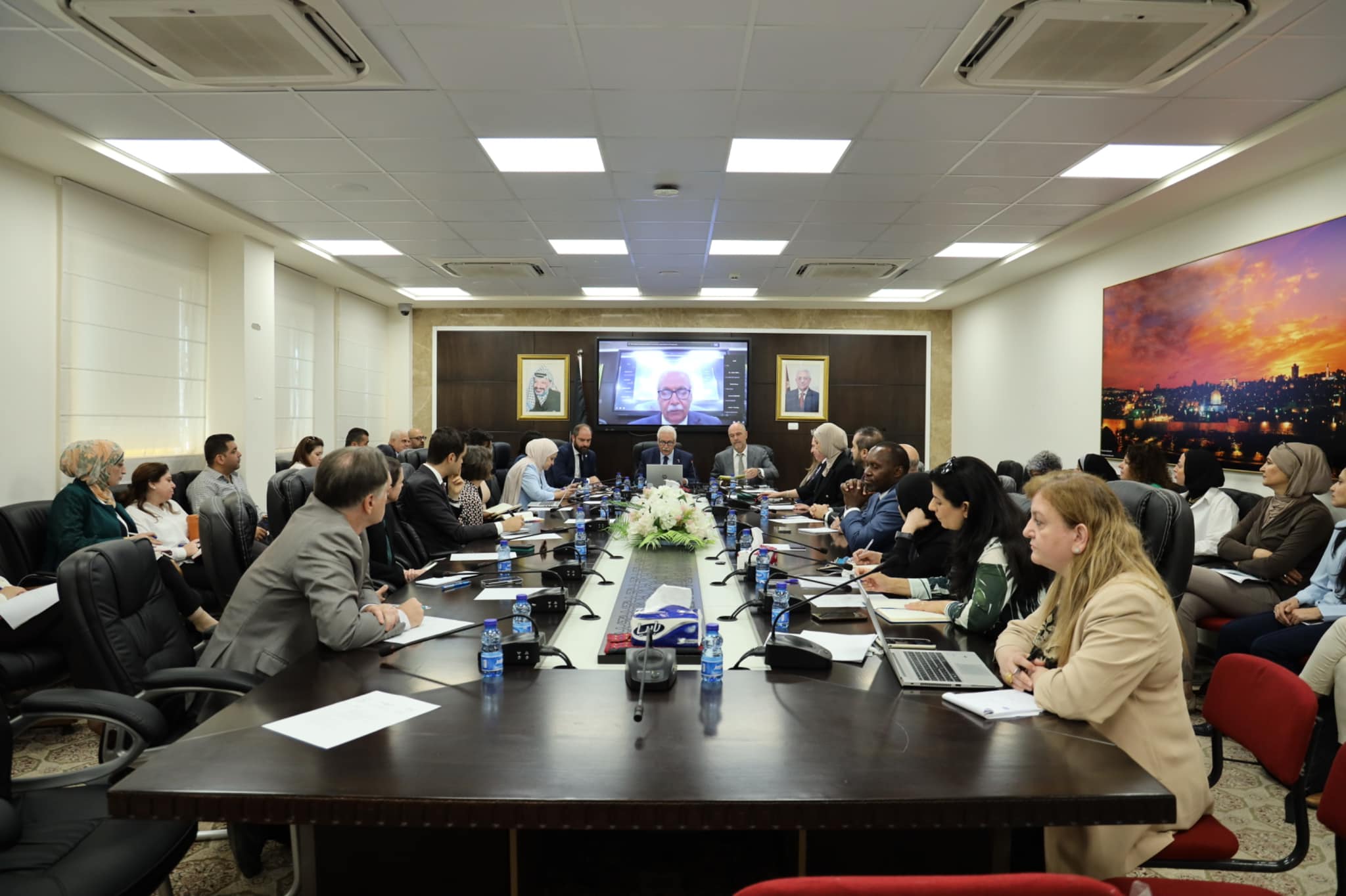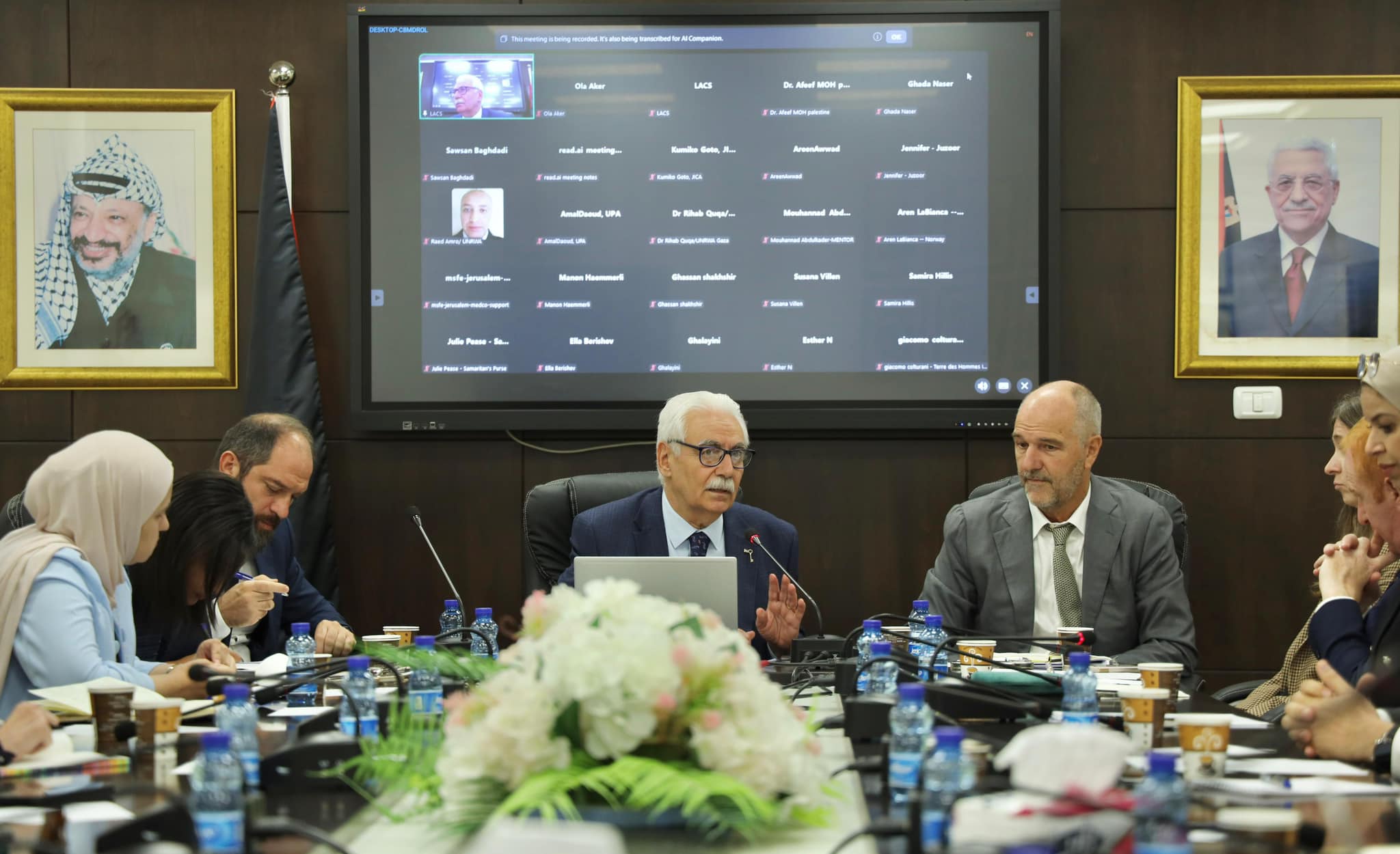 The Minister of Health, Dr. Majid Abu Ramadan, chaired a meeting of the Health Sector Working Group, attended by the Head of the Italian Agency for Development Cooperation – Jerusalem Office, Mirko Tricoli, Dr. Rik Peeperkorn, WHO Representative in Palestine and the group’s technical advisor, as well as members of the group, representatives from international and national organizations.
The Minister of Health, Dr. Majid Abu Ramadan, chaired a meeting of the Health Sector Working Group, attended by the Head of the Italian Agency for Development Cooperation – Jerusalem Office, Mirko Tricoli, Dr. Rik Peeperkorn, WHO Representative in Palestine and the group’s technical advisor, as well as members of the group, representatives from international and national organizations.
The Palestinian Minister of Health Abu Ramadan said “We stand together today at a crucial moment, as our people’s health and the stability of our healthcare system face extraordinary challenges. The relentless aggression of the Israeli occupation in both the southern and northern governorates has created a crisis of unprecedented magnitude. Coupled with a deepening financial crisis, these conditions threaten lives and severely limit our capacity to meet the growing needs of our community.”
“Since last October” – the Minister said -” the Israeli aggression has caused the complete collapse of the health system in the southern governorates. Out of 38 hospitals—both governmental and non-governmental—23 are now non-operational, leaving only 15 functioning partially. Moreover, 80 of 90 healthcare centers are out of service, over 130 ambulances have been destroyed, and tragically, more than 986 medical personnel and health workers have lost their lives.”
“The damage to our hospital infrastructure has made it impossible to handle the overwhelming number of injuries and casualties”- continued the Minister – “At least 14,000 patients urgently need to be transferred outside for treatment, but life-saving services—like cancer care and chronic disease management—are often unavailable, putting even more pressure on our already strained health system. With all crossings to the southern governorates closed, these patients face life-threatening delays, and the blockade on medical supplies, food, and shelter endangers the lives of our 2.2 million people.
The Minister highlighted “The mental health crisis is worsening under the daily aggression of the Israeli occupation, with increasing rates of depression, anxiety, and post-traumatic stress disorder, particularly among children in Gaza. Our ability to provide mental health services is severely limited, with only a handful of trained specialists and scarce resources for ongoing care. Additionally, non-communicable diseases are becoming a heavy burden, highlighting the urgent need for immediate collective action.
Lastly, Dr. Abu Ramadan stated: “In addition to the budget deficit, international aid has significantly declined in recent years, hindering the growth and development of our health sector. Nevertheless, we are committed to strengthening, reforming, and developing the Palestinian health system with the support of our partners. I urge the community and international human rights organizations to increase pressure on the occupying authorities to end their aggression, allow immediate entry of vital health support, and facilitate the transfer of the injured and sick for treatment. We also need robust health support from various organizations and institutions.”

Mirko Tricoli, Head of the Italian Agency for Development Cooperation in Jerusalem, reaffirmed Italy’s commitment to supporting the Palestinian health sector. He emphasized the urgent need for increased efforts from all partners to mobilize vital health support for Palestine.
Dr. Rik Peeperkorn WHO Representative in Palestine, highlighted the organization’s ongoing efforts to address the urgent health challenges in Gaza and the West Bank. He stressed the critical need for additional support and collaboration from all partners.
The meeting featured several presentations detailing the health situation in the Southern and Northern Governorates, outlining essential health needs, showcasing the efforts of health organizations in both regions, and discussing strategies for future health initiatives.
